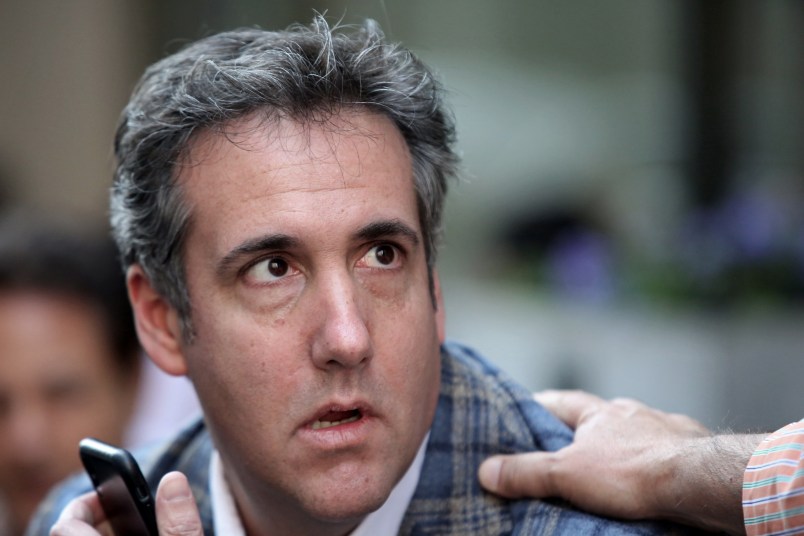NEW YORK (AP) — President Donald Trump’s personal attorney, whose business dealings are being investigated by the FBI, and the lawyer’s father-in-law have lent $26 million in recent years to a taxi mogul who is shifting into the legalized marijuana industry, according to documents obtained by The Associated Press.
Semyon “Sam” Shtayner, a longtime business associate of Michael Cohen’s father-in-law, created Nevada-based Cannaboss LLC the day before the 2016 election. A few months later, he took a majority position in a company that is provisionally licensed to cultivate medicinal marijuana and produce edibles, the records show.
“He personally manages over 500 taxi medallions, but he is looking to transition from the medallion business to the cannibas (sic),” according to the personal narrative Shtayner submitted last October to city officials in Henderson, Nevada, that was obtained by the AP under the state’s public records law.
It’s not clear whether Shtayner used any of the loans — $6 million of which have come directly from Cohen since 2014 — to finance his grow operation.
Earlier this month, FBI agents searched Cohen’s hotel, office and home seeking banking records, as well as records related to his dealings in the taxi industry, people familiar with the probe told the AP, speaking on condition of anonymity because they were not authorized to discuss the ongoing investigation.
Public records show the Ukraine-born Shtayner, 63, his wife and companies they control have used their properties in Chicago and Sunny Isles, Florida, as collateral for the loans from Cohen and his father-in-law, Fima Shusterman.
Neither Cohen nor his attorney responded to phone messages or an email seeking comment about the loans.
An attorney representing Shtayner in his Nevada marijuana ventures told the AP his client had no comment.
Reached on his cellphone, Shusterman declined to discuss his loans or Shtayner.
News of Shtayner’s ties to the medical marijuana industry comes as the Trump administration finds itself somewhat split on marijuana policy.
Trump recently indicated he will support a law protecting states that already have legalized the drug — a position counter to that of Attorney General Jeff Sessions, who stridently opposes any such effort and in January lifted restrictions that had kept federal prosecutors from pursuing cases against those complying with state marijuana laws.
Marijuana use is fully legal in Nevada, seven other states and Washington, D.C., and 38 states allow medicinal or other limited uses.
It was not clear why Shtayner has decided to move out of taxis and into the grow business. But the rapid rise of ride-hailing apps such as Uber and Lyft has disrupted the taxi industry, and Shtayner is among a handful of prominent taxi owners who face lawsuits from creditors who once lent liberally to medallion owners.
The value of medallions — the physical plates affixed to cabs that owners are required to display — have dropped precipitously in recent years from highs of over $1 million apiece in New York just a few years ago to nearly half that amount today.
The subsequent drop has left many taxi medallion owners overleveraged.
One former Cohen business partner, who managed Cohen’s taxis for years, is accused in a lawsuit by creditors of hiding his assets in financial disclosures to his bank — including a luxury apartment in a Trump skyscraper.
Another former cab manager of Cohen’s has declared bankruptcy and is facing criminal charges from state prosecutors in New York, who accuse him of pocketing nearly $5 million in taxes.
The business relationship among Cohen, Shusterman and Shtayner stretches back years. Property records in New York show that Shtayner and Shusterman were among the investors in an upper Manhattan taxi garage and auto repair shop in the 1990s.
Last August, Shusterman lent at least $12 million against properties owned by Shtayner, his wife or their companies, Chicago real estate records show. In a second series of four transactions in March, Shusterman lent the Shtayners or their companies an additional $8 million.
Four of the loans were made to Shtayner’s wife, Yasya, and four others were directed to two Chicago taxi companies she manages, according to corporate documents. The Chicago Sun-Times first reported those transactions.
Cohen has been involved in the New York City yellow cab industry since the 1990s. He has a fleet of 22 cabs in Chicago and, along with his wife and father-in-law, has owned some 30 medallions in New York after initially going into business with his father-in-law, records show.
Shusterman — who, like Shtayner, started as a cab driver after emigrating from Ukraine — pleaded guilty in 1993 to federal money-laundering charges in a tax-evasion case involving cab drivers and a Brooklyn accountant.
Shtayner’s Chicago cab empire has grown rapidly, though records show that 99 of his medallions are in foreclosure and 15 have some sort of violation. Forty-nine have already been taken over by the city for failure to pay taxes and fees.
Although Shtayner has been sued by creditors, operates a taxi business in a harrowing time for his industry and is borrowing heavily in nontraditional loans, the city of Henderson concluded that he is adequately liquid financially. The city’s business operation division found that Shtayner and his business partner, a Las Vegas-based steel and aluminum provider, each had liquid assets that exceed the state’s requirement that they be able to free up to $250,000 within 30 days if needed, according to the records obtained by the AP.







“sez who ? sez who?”
It’s Labrador, man…
(with embedded link to Cohen and the Sopranos theme)
Talk about going to pot…